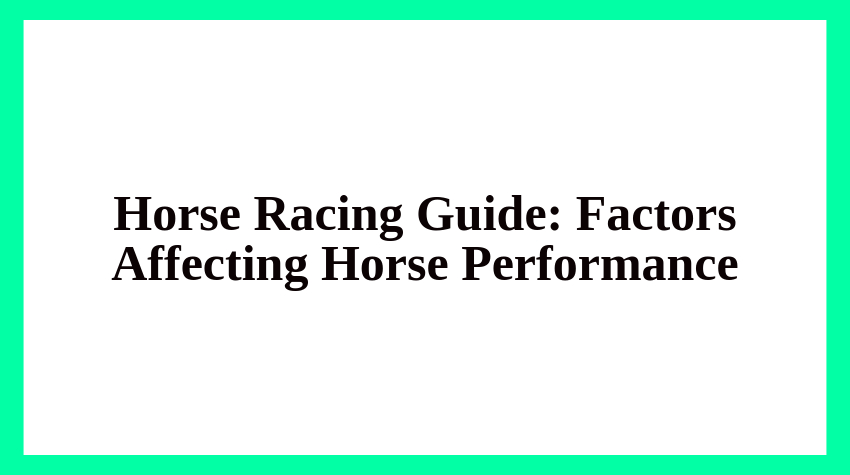For online casino players in Japan exploring the world of horse racing, it’s not just about picking a name that sounds lucky or betting on the favorite. Winning in horse racing often comes down to knowledge — especially understanding what affects a horse’s performance on race day.
From a horse’s physical condition to the weather overhead, many factors can influence the outcome of a race. This comprehensive guide from Casino Savvy explores the most crucial performance variables, helping you make smarter betting decisions and enjoy the thrill of racing with confidence.
👉 New to horse racing? Check out our beginner guide: What is Horse Racing?
🐴 Horse-Related Factors That Affect Performance
Age and Physical Development
Age plays a pivotal role in a horse’s speed, stamina, and recovery. Horses typically reach their peak racing performance between ages 3 and 5. Here’s how age breaks down:
- 2-Year-Olds: Young and fast but inexperienced. They may perform inconsistently.
- 3–5-Year-Olds: Considered the prime years. Muscles and cardiovascular systems are fully developed.
- 6 Years and Up: Experience increases, but physical decline (especially in joints) can begin.
Aging horses may still win races, especially with good care, but knowing their age helps you gauge both consistency and risk.
Breed and Bloodline
Not all racehorses are created equal. Thoroughbreds dominate flat racing thanks to their speed and agility. But beyond the breed, a horse’s bloodline — its parents and grandparents — is often a strong predictor of performance.
- Horses from champion sires often inherit stamina and competitive traits.
- Some bloodlines are known for excelling in specific race types (sprint vs. distance).
Professional bettors often research a horse’s pedigree before placing large wagers.
🏋️ Training and Conditioning
Trainer Reputation and Strategy
A top-tier trainer can elevate even an average horse. Experienced trainers know how to:
- Structure workouts to build endurance and speed.
- Select races that suit the horse’s strengths.
- Prepare the horse mentally for high-pressure environments.
Trainers like Bob Baffert or Yasuo Tomomichi are respected in racing circles for consistently producing winners. When reviewing race cards, always take note of the trainer.
Fitness and Race Readiness
You can have the best genetics and training, but if a horse isn’t in top condition, performance will suffer.
Look for:
- Recent workout times (available in race forms).
- Race frequency: Too many races can cause fatigue. Too few, and they may lack sharpness.
- Returning from injury: Always a risk. Check recovery timeline and vet notes.
Fitness isn’t always obvious to casual observers, but savvy bettors dig into recent performance and training indicators.
🧑✈️ Jockey Influence
Experience and Track Record
The jockey-horse connection is crucial. A skilled jockey can maximize a horse’s potential, adjust strategy mid-race, and navigate crowded fields.
Key things to examine:
- Past wins at the specific track.
- History with the horse — horses often run better with familiar riders.
- Overall win percentage.
In Japan, top jockeys like Yutaka Take have become household names for a reason — they consistently deliver top finishes, even on less-favored horses.
Race Tactics and Decision-Making
Jockeys must make split-second decisions:
- When to hold back or push forward
- How to handle tight turns or shifting conditions
- When to avoid traffic or take an inside lane
A brilliant jockey can win a race with timing alone, even if their mount isn’t the fastest on paper. That’s why experienced bettors never ignore who’s holding the reins.
🌦️ Environmental and External Conditions
Weather and Track Conditions
Rain can turn a firm track into mud within hours — dramatically altering performance outcomes.
- Wet tracks: Favor horses known as “mudders” who perform well in sloppy conditions.
- Dry or fast tracks: Usually favor front-runners with strong early speed.
Always check the forecast and track updates before race time. Even slight changes can sway the race dynamic.
Post Position and Race Length
Starting gate position matters more than you think:
- Inside posts (1–3): Better for short distances but risk being boxed in.
- Middle and outside: More room for strategy, especially for stalkers and closers.
Race length also matters:
- Short sprints (under 1400m): Speed and quick breaks matter most.
- Middle to long distances: Stamina, pacing, and jockey timing become crucial.
🧠 Psychological and Behavioral Traits
Temperament and Focus
A horse may be physically fit but mentally unfocused. Common issues:
- Gate anxiety: Some horses struggle to start strong.
- Nervousness: Can burn energy before the race even begins.
- Aggression: Might interfere with other horses, leading to penalties or poor performance.
Calm, confident horses with a good temperament often perform better under pressure.
Track Familiarity and Travel Stress
Racing in a familiar environment can help horses feel more at ease. On the flip side:
- Traveling long distances can cause fatigue or stress.
- First-time runners at a particular track may perform inconsistently.
Some horses thrive when running at home tracks or in similar environments.
📊 Data-Driven Insights for Smarter Betting
Interpreting Past Performance Data
Understanding past race results is essential:
- Check win/place percentages over similar distances or track types.
- Look at recent finishes — improving horses may be on an upward trend.
- Combine performance data with conditions (weather, surface, jockey) to assess relevance.
A horse might finish 5th in one race but against a stronger field — that can still be promising.
Using Ratings and Handicap Information
Most races assign handicap weights based on previous success. Heavier weights = more difficulty.
- A top-rated horse carrying extra weight may still win, but underdogs with light weights often surprise.
- Study official ratings and the impact of recent changes before betting.
Advanced bettors build models around this data, but casual players can still benefit from understanding the basics.
🎯 Conclusion: Bringing It All Together

\ Place Your Bets and Gallop Towards Victory! /
In horse racing, performance isn’t just about raw speed — it’s the result of a complex combination of age, genetics, training, human strategy, and even the weather. By analyzing these key factors, you can elevate your understanding of the sport and make more informed betting decisions.
Whether you’re placing your first wager or refining your handicapping skills, remember this: successful bettors don’t rely on luck — they rely on knowledge.
If you’re eager to explore more horse racing tips, strategies, and beginner guides tailored for Japanese online casino players, Casino Savvy has you covered. Visit us at https://free-gamblings.com/ and sharpen your racing insight today.









Comments